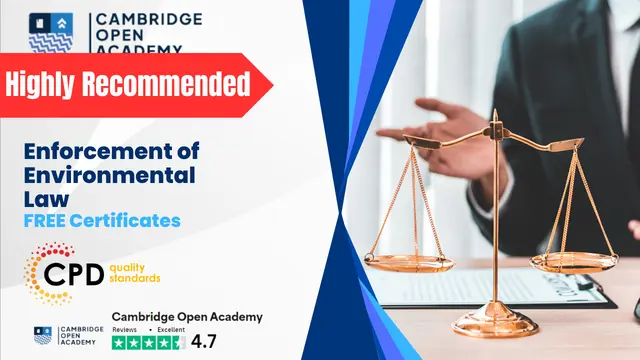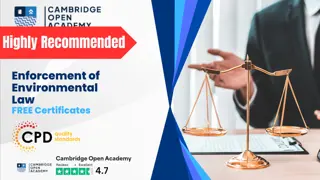
Enforcement of Environmental Law, Strategies and Tools
CPD Accredited | Updated Module 2024 | FREE PDF Certificates + 1 FREE Course | Lifetime Access | Experts’ Crafted
Cambridge Open Academy
Summary
- Certificate of Completion (PDF) - Free
- Certificate of Completion (Hard Copy) - £9.99
- Exam(s) / assessment(s) is included in price
- Tutor is available to students
Add to basket or enquire
Overview
Imagine a world where humanity and nature coexist in perfect harmony, where our actions don't leave lasting scars on the environment. This idyllic vision is one step closer to reality with the enforcement of Environmental Law. As our planet faces numerous challenges, it's crucial that we understand and uphold the principles of Environmental Law to ensure the health and well-being of all living beings.
Learning Outcomes:
- Gain a comprehensive understanding of the legal system and the role of Environmental Law within it
- Analyse international and national environmental policies, such as the Kyoto Protocol, Paris Agreement, and the National Environmental Legacy Act
- Examine the relationship between the environment and economics to assess the impact of environmental policies on economic development
- Evaluate the effectiveness of Environmental Impact Assessments and nature conservation measures
- Understand the principles of sustainable development and the importance of compliance and governance in Environmental Law
- Discover the significance of public participation, access to information, and environmental justice in enforcing Environmental Law
CPD
Course media
Description
Environmental Law is a crucial aspect of sustainable development, shaping our interactions with the environment. It involves understanding the legal system, international and national environmental policies, and the organisations enforcing these laws. By understanding the mechanisms governing Environmental Law, individuals can contribute to protecting the planet and making a positive impact.
Curriculum breakdown:
- Module 01: Legal System
- Module 02: What is Environmental Law
- Module 03: International Environment law
- Module 04: Environmental Organisations
- Module 05: National Environmental Legacy Act
- Module 06: The Environment and Economics Part 1
- Module 07: The Environment and Economics Part 2
- Module 08: Climate Change
- Module 09:Climate Change
- Module 10: Climate Change
- Module 11: Kyoto Protocol and Paris Agreement
- Module 12: Sustainable Development
- Module 13: Compliance and Governance of Law
Who is this course for?
- Law students seeking to specialise in Environmental Law
- Environmental activists and campaigners looking to understand the legal framework surrounding environmental issues
- Policy-makers and government officials responsible for drafting and implementing environmental policies
- Environmental consultants and auditors who need to stay up-to-date with current regulations
- Business professionals in industries with environmental impacts, such as energy, construction, and manufacturing
- Individuals passionate about the environment and interested in acquiring a solid foundation in Environmental Law
Requirements
- No prior knowledge needed
- Compatible with any internet-enabled device, including computers, tablets, and smartphones.
- Consistent learning experience
- Accessible anywhere, anytime
- No limitations on access
- Use Wi-Fi or mobile data
Career path
- Environmental Lawyer (Salary range: £45,000 - £95,000)
- Environmental Policy Advisor (Salary range: £35,000 - £70,000)
- Environmental Compliance Officer (Salary range: £30,000 - £60,000)
- Conservation Project Manager (Salary range: £25,000 - £50,000)
- Environmental Consultant (Salary range: £28,000 - £65,000)
- Sustainability Officer (Salary range: £25,000 - £45,000)
Questions and answers
Currently there are no Q&As for this course. Be the first to ask a question.
Certificates
Certificate of Completion (PDF)
Digital certificate - Included
Certificate of Completion (Hard Copy)
Hard copy certificate - £9.99
Note: Delivery of hardcopy certificate is free within the United Kingdom. However, to obtain a hardcopy certificate, international students have to pay £19.99 for the shipment to their designated address.
Reviews
Currently there are no reviews for this course. Be the first to leave a review.
Legal information
This course is advertised on reed.co.uk by the Course Provider, whose terms and conditions apply. Purchases are made directly from the Course Provider, and as such, content and materials are supplied by the Course Provider directly. Reed is acting as agent and not reseller in relation to this course. Reed's only responsibility is to facilitate your payment for the course. It is your responsibility to review and agree to the Course Provider's terms and conditions and satisfy yourself as to the suitability of the course you intend to purchase. Reed will not have any responsibility for the content of the course and/or associated materials.







